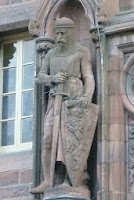 |
| Wallace statue by D. W. Stevenson on the Scottish National Portrait Gallery,Edinburgh |
Hi! I am
going to write about a Scottish hero, William Wallace.
This man,
William Wallace (in medieval gaelic Uilliam Uallas), was one of the main
leaders during the Wars of Scottish
Independence (13th and 14th centuries).
Since 1297 he managed the insurrection against Edward I of England, who
had occupied the Scottish throne. Even
nowadays he is the emblem of the Scottish independence, because he fought and
died for it.
There is no
much information about Wallace or his parentage. Every reference to his life is
from a medieval epic poem by Blind Harry named The Wallace (15th century). Here are the opening lines, translated
into modern English by William of Gilbertfield in 1722:
Life of Sir
William Wallace
Of our ancestors, brave true ancient Scots,
Whose glorious scutcheons knew no bars or blots;
But blood untainted circled ev'ry vein,
And ev'ry thing ignoble did disdain;
Of such illustrious patriots and bold,
Who stoutly did maintain our rights of old,
Who their malicious, invet'rate foes,
With sword in hand, did gallantly oppose:
And in their own, and nation's just defence,
Did briskly check the frequent insolence
Of haughty neighbours, enemies profest,
Picts, Danes, and Saxons, Scotland's very pest;
Of such, I say, I'll brag and vaunt so long
As I have power to use my pen or tongue;
And sound their praises in such modern strain
As suiteth best a Scot's poetic vein,
First, here I honour, in particular,
Sir William Wallace, much renown'd in war,
Whose bold progenitors have long time stood,
Of honourable and true Scottish blood.
Whose glorious scutcheons knew no bars or blots;
But blood untainted circled ev'ry vein,
And ev'ry thing ignoble did disdain;
Of such illustrious patriots and bold,
Who stoutly did maintain our rights of old,
Who their malicious, invet'rate foes,
With sword in hand, did gallantly oppose:
And in their own, and nation's just defence,
Did briskly check the frequent insolence
Of haughty neighbours, enemies profest,
Picts, Danes, and Saxons, Scotland's very pest;
Of such, I say, I'll brag and vaunt so long
As I have power to use my pen or tongue;
And sound their praises in such modern strain
As suiteth best a Scot's poetic vein,
First, here I honour, in particular,
Sir William Wallace, much renown'd in war,
Whose bold progenitors have long time stood,
Of honourable and true Scottish blood.
Along with Andrew Moray, William Wallace defeated an English army at the
Battle of Stirling Bridge in September 1297, and was appointed Guardian of
Scotland, serving until his defeat at the Battle of Falkirk in July 1298.
William Wallace lived as an outlaw until his capture in 1305. What we certainly
know about his life is his death date: 23rd August 1305, everything
else, like his birthplace (that is thought to be Elderslie) is speculating. He
was captured by the English and tried for treason and for atrocities against civilians in war,
"sparing neither age nor sex, monk nor nun." He was crowned with a
garland of oak to suggest he was the king of outlaws. He responded to the
treason charge, "I could not be a traitor to Edward, for I was never his
subject." His execution was horrible, he was hanged,
drawn and quartered — strangled by hanging but released while he
was still alive, emasculated, eviscerated and his bowels burnt before
him, beheaded, then cut into four parts. His preserved head (dipped in
tar) was placed on a pike atop London Bridge as a warning to traitors to
England.
Wallace’s
life has been brought to the big screen several times. The most known movie of
him is “Braveheart”, in which Mel Gibson acted as William Wallace. I love this
film, my favourite scene is Wallace´s speech about freedom.This scene gives me goosebumps everytime i watch it!
I hope you enjoyed this Scottish history tour!! Bye!!
marmarter
No comments:
Post a Comment